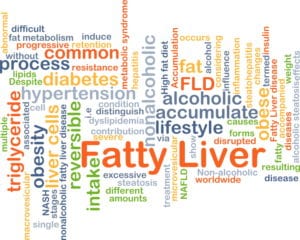Written by Chrystal Moulton, Staff Writer. Based on the results of this study, cornelian cherry supported improvement in blood pressure, body fat percentage, and body fat mass in patients with non-alcoholic fatty liver.
 Cornelian cherry (Cornus mas L.) is a rich source of anti-inflammatory and antioxidant components1. A limited number of studies have examined the effect of cornelian cherry on body composition indices2,3. However, its effect on this lipidemia inflammation and insulin resistance in the pathogenesis of non-alcoholic fatty liver disease has been examined2,3. Studies have already shown insulin resistance, dyslipidemia, and inflammation are factors that contribute to the development and progression of non-alcoholic fatty liver disease4. Also, the most chronic liver disease worldwide and the main cause of liver transplantation is non-alcoholic fatty liver disease5,6. Thus, in the current study, researchers investigated the effectiveness of cornelian cherry on patients diagnosed with non-alcoholic fatty liver disease7.
Cornelian cherry (Cornus mas L.) is a rich source of anti-inflammatory and antioxidant components1. A limited number of studies have examined the effect of cornelian cherry on body composition indices2,3. However, its effect on this lipidemia inflammation and insulin resistance in the pathogenesis of non-alcoholic fatty liver disease has been examined2,3. Studies have already shown insulin resistance, dyslipidemia, and inflammation are factors that contribute to the development and progression of non-alcoholic fatty liver disease4. Also, the most chronic liver disease worldwide and the main cause of liver transplantation is non-alcoholic fatty liver disease5,6. Thus, in the current study, researchers investigated the effectiveness of cornelian cherry on patients diagnosed with non-alcoholic fatty liver disease7.
In a randomized double-blind placebo-controlled study researchers evaluated the effect of cornelian cherry on blood pressure and body composition indices in patience with non-alcoholic fatty liver disease. The study duration was 12 weeks. Fifty patients were randomly assigned to the treatment group and control group. Individuals assigned to the treatment group received 20ml/d of cornelian cherry fruit extract (equivalent to 2800 mg dried extract; 32 mg/d total anthocyanin). Individuals in the placebo group received 20 ml/d of purified water with red color carmoisine. Both patients and investigators were blinded. Volunteers were asked to maintain regular dietary intake during the intervention. They were not allowed to have any special diets during the study. Dietary intake was evaluated at baseline and week 12 using a three-day food record. Compliance was assessed every two weeks based on extract consumption. Participants received bottles every two weeks based on their assigned protocol. Physical activity assessment, blood pressure measurement, and body composition evaluations were done at baseline and after completion of study. Adverse events were checked every two weeks.
By the end of week 12, 40 patients completed the trial. No significant difference was found between the treatment and control groups in baseline variables Including dietary intake and physical activity at baseline and at completion of the trial. By the end of the trial, participants in the treatment group experienced significant improvement in diastolic and systolic blood pressure measurements (P= 0.001 and P= 0.006, respectively). A significant difference was also observed between the treatment group and the placebo for both diastolic and systolic blood pressure (P= 0.03 and P= 0.02, respectively). For body composition measurements significant difference was found between the treatment and placebo group for body fat mass (P= 0.01) and body fat percentage (P= 0.02). No significant differences were observed in weight, hip circumference, waist circumference, waist to hip ratio, and fat free mass.
Based on the results of this study, cornelian cherry supported improvement in blood pressure, body fat percentage, and body fat mass in patients with non-alcoholic fatty liver disease. Additional studies will be needed to confirm the results found in this trial.
Source: Yarhosseini, Faezeh, Abbas Ali Sangouni, Zohreh Sadat Sangsefidi, Mahdieh Hosseinzadeh, Mohsen Akhondi-Meybodi, Alimohammad Ranjbar, Hossein Fallahzadeh, and Hassan Mozaffari-Khosravi. “Effect of Cornus mas L. fruit extract on blood pressure, anthropometric and body composition indices in patients with non-alcoholic fatty liver disease: A double-blind randomized controlled trial.” Clinical Nutrition ESPEN 56 (2023): 18-24.
© 2023 European Society for Clinical Nutrition and Metabolism. Published by Elsevier Ltd. All rights reserved.
Click here to read the full text study.
Posted August 8, 2023.
Chrystal Moulton BA, PMP, is a 2008 graduate of the University of Illinois at Chicago. She graduated with a bachelor’s in psychology with a focus on premedical studies and is a licensed project manager. She currently resides in Indianapolis, IN.
References:
- Dinda B, Kyriakopoulos AM, Dinda S, et al. Cornus mas L. (cornelian cherry), an important European and Asian traditional food and medicine: Ethnomedicine, phytochemistry and pharmacology for its commercial utilization in drug industry. J Ethnopharmacol. Dec 4 2016;193:670-690. doi:10.1016/j.jep.2016.09.042
- Asgary S, Kelishadi R, Rafieian-Kopaei M, Najafi S, Najafi M, Sahebkar A. Investigation of the lipid-modifying and antiinflammatory effects of Cornus mas L. supplementation on dyslipidemic children and adolescents. Pediatr Cardiol. Oct 2013;34(7):1729-35. doi:10.1007/s00246-013-0693-5
- Gholamrezayi A, Aryaeian N, Rimaz S, et al. The effect of Cornus mas fruit extract consumption on lipid profile, glycemic indices, and leptin in postmenopausal women- A randomized clinical trial. Phytother Res. Nov 2019;33(11):2979-2988. doi:10.1002/ptr.6476
- Sangouni AA, Ghavamzadeh S. A review of synbiotic efficacy in non-alcoholic fatty liver disease as a therapeutic approach. Diabetes & metabolic syndrome. Sep-Oct 2019;13(5):2917-2922. doi:10.1016/j.dsx.2019.07.063
- Wong RJ, Aguilar M, Cheung R, et al. Nonalcoholic steatohepatitis is the second leading etiology of liver disease among adults awaiting liver transplantation in the United States. Gastroenterology. Mar 2015;148(3):547-55. doi:10.1053/j.gastro.2014.11.039
- Rinella ME. Nonalcoholic fatty liver disease: a systematic review. Jama. Jun 9 2015;313(22):2263-73. doi:10.1001/jama.2015.5370
- Yarhosseini F, Sangouni AA, Sangsefidi ZS, et al. Effect of Cornus mas L. fruit extract on blood pressure, anthropometric and body composition indices in patients with non-alcoholic fatty liver disease: A double-blind randomized controlled trial. Clin Nutr ESPEN. Aug 2023;56:18-24. doi:10.1016/j.clnesp.2023.04.018
